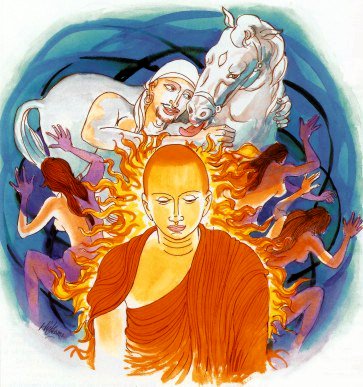Where in the world is found
one restrained by shame,
awakened out of sleep
as splendid horse with whip?
Explanation: Rarely in the world is that person who is restrained by shame. Like a well-breed horse who avoids the whip, he avoids disgrace.
The Story of Venerable Pilotikatissa (Verses 143 & 144)
While residing at the Jetavana Monastery, the Buddha spoke these verses, with reference to Venerable Pilotikatissa.
Once, Venerable Ananda saw a shabbily dressed youth going around begging for food; he felt pity for the youth and made him a samanera. The young novice monk left his old clothes and his begging plate on the fork of a tree. When he became a monk he was known as Pilotikatissa. As a monk, he did not have to worry about food and clothing as he was in affluent circumstances. Yet, sometimes he did not feel happy in his life as a monk and thought of going back to the life of a layman. Whenever he had this feeling, he would go back to that tree where he had left his old clothes and his plate. There, at the foot of the tree, he would put this question to himself, “Oh shameless one! Do you want to leave the place where you are fed well and dressed well? Do you still want to put on these shabby clothes and go begging again with this old plate in your hand?” Thus, he would rebuke himself, and after calming down, he would go back to the monastery.
After two or three days, again, he felt like leaving the monastic life of a monk, and again, he went to the tree where he kept his old clothes and his plate. After asking himself the same old question and having been reminded of the wretchedness of his old life, he returned to the monastery. This was repeated many times. When other monks asked him why he often went to the tree where he kept his old clothes and his plate, he told them that he went to see his teacher. Thus keeping his mind on his old clothes as the subject of meditation, he came to realize the true nature of the aggregates of the khandhas, such as anicca, dukkha, anatta, and eventually he became an arahat. Then, he stopped going to the tree. Other monks, noticing that Pilotikatissa had stopped going to the tree where he kept his old clothes and his plate, asked him, “Why don’t you go to your teacher any more?” To them, he answered, ‘When I had the need, I had to go to him; but there is no need for me to go to him now.” When the monks heard his reply, they took him to see the Buddha. When they came to his presence they said, “Venerable! This monk claims that he has attained arahatship; he must be telling lies.” But the Buddha refuted them, and said, “Monks! Pilotikatissa is not telling lies, he speaks the truth. Though he had relationship with his teacher previously, now he has no relationship whatsoever with his teacher. Venerable Pilotikatissa has instructed himself to differentiate right and wrong causes and to discern the true nature of things. He has now become an arahat, and so there is no further connection between him and his teacher.”

